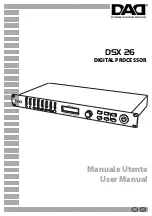
User’s Manual
PPC440x5 CPU Core
Preliminary
Page 66 of 589
prgmodel.fm.
September 12, 2002
The PPC440x5 core combines the static prediction mechanism defined by PowerPC Book-E, together with a
dynamic branch prediction mechanism, in order to provide correct branch prediction as often as possible. The
dynamic branch prediction mechanism is an implementation optimization, and is not part of the architecture,
nor is it visible to the programming model. Appendix B, “PPC440x5 Core Compiler Optimizations,” provides
additional information on the dynamic branch prediction mechanism.
The static branch prediction mechanism enables software to designate the “preferred” branch prediction via
bits in the instruction encoding. The “default” static branch prediction for conditional branches is as follows:
Predict that the branch is to be taken if ((BO[0]
∧
BO[2])
∨
s) = 1
where
s is bit 16 of the instruction (the sign bit of the displacement for all bc forms, and zero for all bclr and
bcctr forms). In other words, conditional branches are predicted taken if they are “unconditional” (i.e., they do
not test the CR nor the CTR decrement, and are always taken), or if their branch displacement is “negative”
(i.e., the branch is branching “backwards” from the current instruction address). The standard prediction for
this case derives from considering the relative form of bc, often used at the end of loops to control the
number of times that a loop is executed. The branch is taken each time the loop is executed except the last,
so it is best if the branch is predicted taken. The branch target is the beginning of the loop, so the branch
displacement is negative and
s = 1. Because this situation is most common, a branch is taken if s = 1.
If branch displacements are positive,
s = 0, then the branch is predicted not taken. Also, if the branch instruc-
tion is any form of
bclr or bcctr except the “unconditional” form, then s = 0, and the branch is predicted not
taken.
There is a peculiar consequence of this prediction algorithm for the absolute forms of bc (bca and bcla). As
described in Branch Addressing on page 64, if
s = 1, the branch target is in high memory. If s = 0, the branch
target is in low memory. Because these are absolute-addressing forms, there is no reason to treat high and
low memory differently. Nevertheless, for the high memory case the standard prediction is taken, and for the
low memory case the standard prediction is not taken.
Another bit in the BO field allows software further control over branch prediction. Specifically, BO[4] is the
prediction reversal bit. If BO[4] = 0, the default prediction is applied. If BO[4] = 1, the reverse of the default
prediction is applied. For the cases in Table 2-23 where BO[4] =
y, software can reverse the default predic-
tion by setting y to 1. This should only be done when the default prediction is likely to be wrong. Note that for
the “branch always” condition, reversal of the default prediction is not allowed, as BO[4] is designated as z for
this case, meaning the bit must be set to 0 or the instruction form is invalid.
2.5.5 Branch Control Registers
There are three registers in the PPC440x5 which are associated with branch processing, and they are
described in the following sections.
2.5.5.1 Link Register (LR)
The LR is written from a GPR using
mtspr, and can be read into a GPR using mfspr. The LR can also be
updated by the “link update” form of branch instructions (instruction field LK = 1). Such branch instructions
load the LR with the address of the instruction following the branch instruction (4 + address of the branch
instruction). Thus, the LR contents can be used as a return address for a subroutine that was entered using a
link update form of branch. The bclr instruction uses the LR in this fashion, enabling indirect branching to any
address.
Summary of Contents for PPC440X5 CPU Core
Page 1: ...PPC440x5 CPU Core User s Manual Preliminary SA14 2613 02 September 12 2002 Title Page...
Page 22: ...User s Manual PPC440x5 CPU Core Preliminary Page 22 of 583 ppc440x5LOT fm September 12 2002...
Page 26: ...User s Manual PPC440x5 CPU Core Preliminary Page 26 of 589 preface fm September 12 2002...
Page 38: ...User s Manual PPC440x5 CPU Core Preliminary Page 38 of 589 overview fm September 12 2002...
Page 94: ...User s Manual PPC440x5 CPU Core Preliminary Page 94 of 589 init fm September 12 2002...
Page 132: ...User s Manual PPC440x5 CPU Core Preliminary Page 132 of 589 cache fm September 12 2002...
Page 158: ...User s Manual PPC440x5 CPU Core Preliminary Page 158 of 589 mmu fm September 12 2002...
Page 218: ...User s Manual PPC440x5 CPU Core Preliminary Page 218 of 589 timers fm September 12 2002...
Page 248: ...User s Manual PPC440x5 CPU Core Preliminary Page 248 of 589 debug fm September 12 2002...
Page 458: ...User s Manual PPC440x5 CPU Core Preliminary Page 458 of 589 regsummIntro fm September 12 2002...
Page 568: ...User s Manual PPC440x5 CPU Core Preliminary Page 568 of 589 instalfa fm September 12 2002...
Page 588: ...User s Manual PPC440x5 CPU Core Preliminary Page 588 of 583 ppc440x5IX fm September 12 2002...
Page 590: ......















































